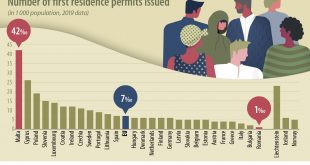Immigration is a hotly debated issue in the EU. To be more precise: immigration from the ‘south’ is hotly debated. Immigration from the East is much more important and increasing. Some facts: Immigration into the EU is increasing and has been increasing for quite some time (the ‘first residence permits’ mentioned in the graph and the quote are not permanent residence permits)This is to a considerable extent caused by immigration into Poland from countries like Ukraine and Belarus....
Read More »Logic and truth in economics
from Lars Syll To be ‘analytical’ and ‘logical’ is something most people find recommendable. These words have a positive connotation. Scientists think deeper than most other people because they use ‘logical’ and ‘analytical’ methods. In dictionaries, logic is often defined as “reasoning conducted or assessed according to strict principles of validity” and ‘analysis’ as having to do with “breaking something down.” But that’s not the whole picture. As used in science, analysis usually means...
Read More »Ecological Economics
from Asad Zaman Eurocentric history portrays the West as advanced, rational, scientific, and democratic, while the East is superstitious, unscientific, autocratic, and backwards. This poisonous philosophy enabled the incredibly brutal and ruthless violence required for the conquest of the globe, and continues to sustain extremely exploitative economic systems. A partial antidote is World Systems theory which portrays all human beings, nations, and cultures, as joint participants in...
Read More »Funeral Mass for Dick Baker
Mass of Christian Burial for Richard "Dick" Dean Baker
Read More »Let the vaccinations begin…
Let’s start to vaccinate as many people as possible as soon as possible. This will, together with other technological solutions like air purifiers, UV-C lamps as well as large scale fast testing, enable us to escape the cycle of alternating lock downs. It will also enable us to at least pursue a policy of total eradication of Covid-19. Lock downs work – for a while. They can buy us time. But the economic, social and psychological consequences are immense and we will have to rely as much...
Read More »‘Mathiness’ in economics
from Lars Syll In practice, what math does is let macro-economists locate the FWUTVs [facts with unknown truth values] farther away from the discussion of identification … Relying on a micro-foundation lets an author say, “Assume A, assume B, … blah blah blah … And so we have proven that P is true. Then the model is identified.” … Distributional assumptions about error terms are a good place to bury things because hardly anyone pays attention to them. Moreover, if a critic does see that...
Read More »A valid ontology for economics?
from Ikonoclast (originally a comment) The challenge is to develop a valid ontology for economics. In medicine, early theories of disease failed to yield efficacious treatments because their ontology (a theory of basic real existents and how they interact) was wrong. A few of the more common ideas founded on false ontologies were that diseases were caused by evil spirits, miasma and imbalances of the four humors. It was not until the advent of the germ theory of disease that real progress...
Read More »Has mainstream economics — really — gone through a pluralist and empirical revolution?
from Lars Syll In an issue of the journal Fronesis yours truly and a couple of other academics (e.g. Julie Nelson, Tony Lawson, and Phil Mirowski) made an effort at introducing its readers to heterodox economics and its critique of mainstream economics. Rather unsurprisingly this hasn’t pleased the Swedish economics establishment. On the mainstream economics blog Ekonomistas, professor Daniel Waldenström rode out to defend the mainstream with the nowadays standard defence — heterodox...
Read More »Will Biden Insist On A Just Recovery? Macroeconomist Dean Baker Joins
Follow on Twitch: https://www.twitch.tv/actdottv Julianna welcomes back recurring guest Dean Baker, Macroeconomist and co-founder of the Center for Economic and Policy Research, to discuss how now that we’re only a few months away from having a new President, Progressive groups are joining forces to demand the change we’re owed for delivering Joe Biden his win... and where Progressive groups are expecting real change is the economy. Dean talks about what’s possible with a...
Read More »Brianne Marie (Lane) Baker v. Kenneth Dean Baker
M2020-00374-COA-R3-CV Court of Appeals Middle Section
Read More » Real-World Economics Review
Real-World Economics Review






